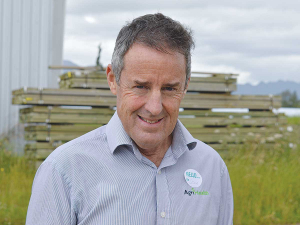Breeding mastitis-resistant cows
Selecting for disease- resistant cows has become a reality for farmers around the globe as genetic developments continue to advance.
 Steve Cranefield, AgriHealth, says mastitis remains the biggest animal health issue in the dairy industry and farmers should take more pride in tackling mastitis.
Steve Cranefield, AgriHealth, says mastitis remains the biggest animal health issue in the dairy industry and farmers should take more pride in tackling mastitis.
Mastitis expert Steve Cranefield is urging farmers to take more pride in lowering their herd’s somatic cell count.
Cranefield made the comments at a Smaller Milk and Supply Herds (SMASH) field day at Tania White’s farm, at Te Aroha, last month.
White’s farm recorded an average somatic cell count of 31,180 – the second lowest among Fonterra suppliers’ last season. She was pipped by her parents Graham and Glenys Bell, who farm up the road and recorded an average SCC of 30,050.
Cranefield, who spoke at the field day, gave the Bells and White a big tick for handling SCC, produced by a cow to fight mastitis.
“They are some of the best in the country,” he told Dairy News.
“There’s a huge element of pride involved; they know they produce the cleanest milk in the country.”
Cranefield says mastitis remains the biggest animal health issue in the dairy industry and farmers should take more pride in tackling mastitis.
He says there are a lot of benefits in keeping SCC down in cows – such as production gains and lower vet costs.
“Every time you treat cows, it costs you hundreds of dollars … financially it stacks up and production wise there is an element of pride.”
Graham Bell told the field day that it’s down to getting the basics right every time.
“There’s no secret, it’s just about doing a good job and paying close attention to detail. We love our stock and want them to be as healthy as possible so we look after them as well as we can,” he says.
“Getting the basics right through our hygiene practices, during the calving period and with our testing means we have a consistently low cell count where the milk quality is better and we have healthier cows.”
Cranefield says key things done by the Bells and Tania White set the cows up well for the next season using a combination of dry cow therapy and teat sealant on cows.
“Right from day one they are focused on mastitis: they are collecting cows in calves twice a day so freshly calved cows are getting milked straight away,” he explains. “Their focus right at start is on improving teat condition so they put teat spray on the colostrum cows before they milk them and repeat after milking.
“Right from start not allowing any spread of infection.”
Nine lucky school leavers passionate about farming will join Pamu for a two-year journey into agriculture, living and working at Pamu farm, Aratiatia near Taupo.
Nutritionists are urging Kiwis to kickstart their day with a piece of fresh fruit to help improve their health and wellbeing this autumn.
Under its innovation strategy, Craigmore Sustainables says it is collaborating with new innovators of technology across sustainability, people, animals and business management to enhance New Zealand's dairy sector.
Deeply cynical and completely illogical. That's how Kimberly Crewther, the executive director of DCANZ is describing the Canadian government's flagrant breach of international trade law in refusing to open its market to New Zealand dairy exports.
This week the winner of the prestigious Ahuwhenua Trophy for the top Māori Dairy farm will be announced at a gala dinner in Hamilton.
Once-a-day milking (OAD) can increase or lower the amounts of proteins in milk, according to a new study published in the journal Dairy.
OPINION: Scientists claim to have found a new way to make a substitute for cow's milk that could have a…
OPINION: The Irish have come up with a novel way to measure cow belching, which is said to account for…